WhatsApp has over 2 billion active users worldwide. It is one of the most popular instant messaging applications as it is free, available on all devices, and user-friendly.
However, users are switching to WhatsApp alternatives because of privacy concerns. The company was fined €5.5m by the Irish Data Protection Commission for the violation of privacy regulations. It also received a fine of €225m from European Union regulators in 2021.
Not only did WhatsApp violate privacy regulations, but it also forced its users to accept the new privacy policy or leave the application. These events have caused mistrust among its users, and they prefer using messaging applications that ensure their privacy.
Other than that, some users look for WhatsApp alternatives to get better features for their needs, as it is unsuitable for various purposes, such as team collaboration, large file sharing, and meetings.
We have analyzed different WhatsApp alternatives based on their performance, features, privacy terms, and other important factors. After careful evaluation, we have hand-picked some of the best options you can go with instead of WhatsApp.
Before we start the count, let's list important factors to consider while looking for a WhatsApp alternative.
What to Consider While Choosing a WhatsApp Alternative
Here are a few important factors you can consider for finding the best WhatsApp alternative:
Encryption: End-to-end encryption is a must. It ensures your conversations and data are private, and no one can access them except you.
Text and video calls: The application should offer text and call options as a perfect WhatsApp alternative. Consider the basic features of the app and what you can do with it.
File sharing: You should be able to send images, videos, music, and other files without hassle. The app should send files without compromising on quality and privacy.
Compatibility: Check the platforms on which the application is available. Most instant messaging apps have iOS and Android versions. They also offer either a desktop app or a web app.
Pricing: Ideally, the application should be free to use, at least for individual users. However, paying for top-notch privacy and security is worth it.
User base: There should be enough user base in the country or region you want to use it. Otherwise, convincing friends and family to switch to a new application will be difficult.
1) Lark
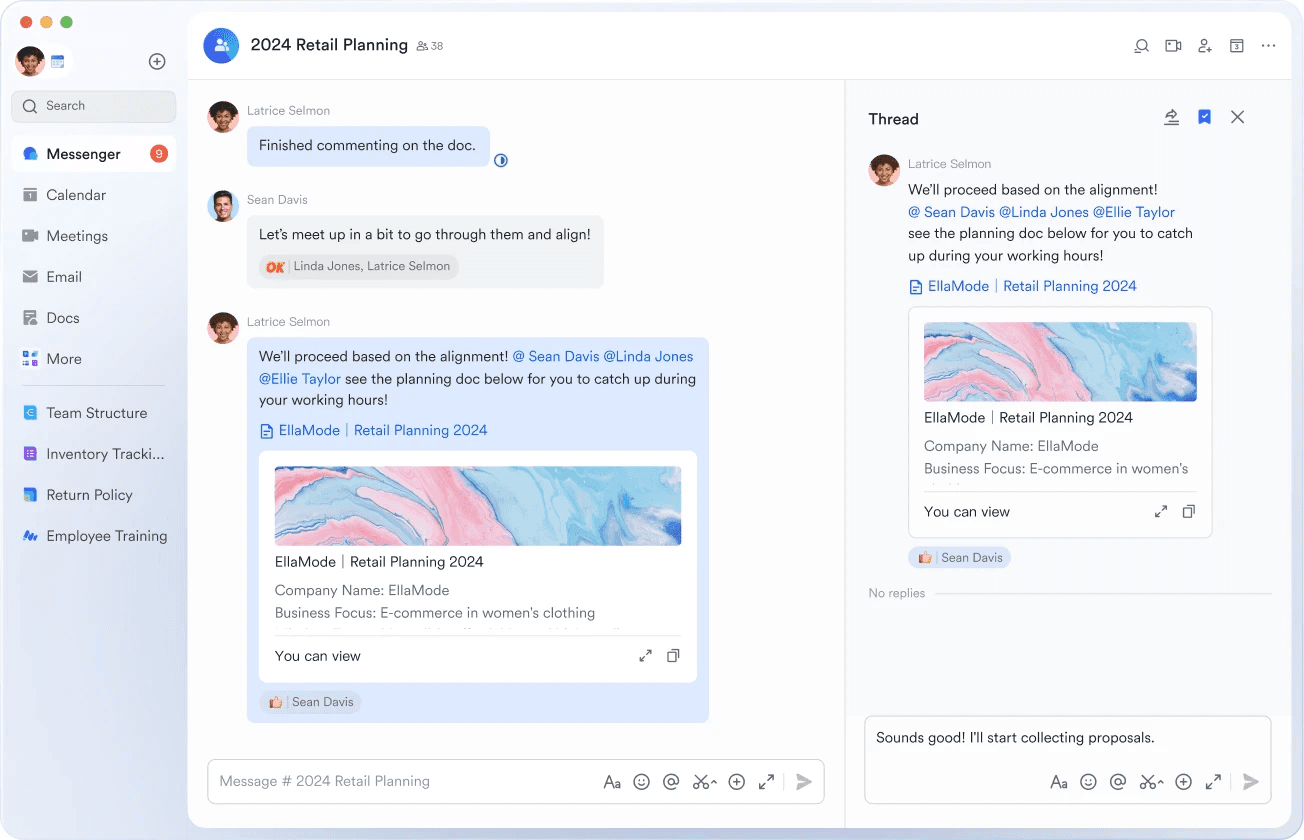
Best for: Teams, businesses, freelancers, and managers for effective collaboration
Lark is an all-in-one productivity app to streamline collaboration. It is a unified platform where you can chat with people, host a video meeting, share documents, manage projects, automate workflows, and do almost everything. This one app can replace dozens of apps used in teams; that's why it is a super app.
Lark's Messenger is more advanced than WhatsApp.
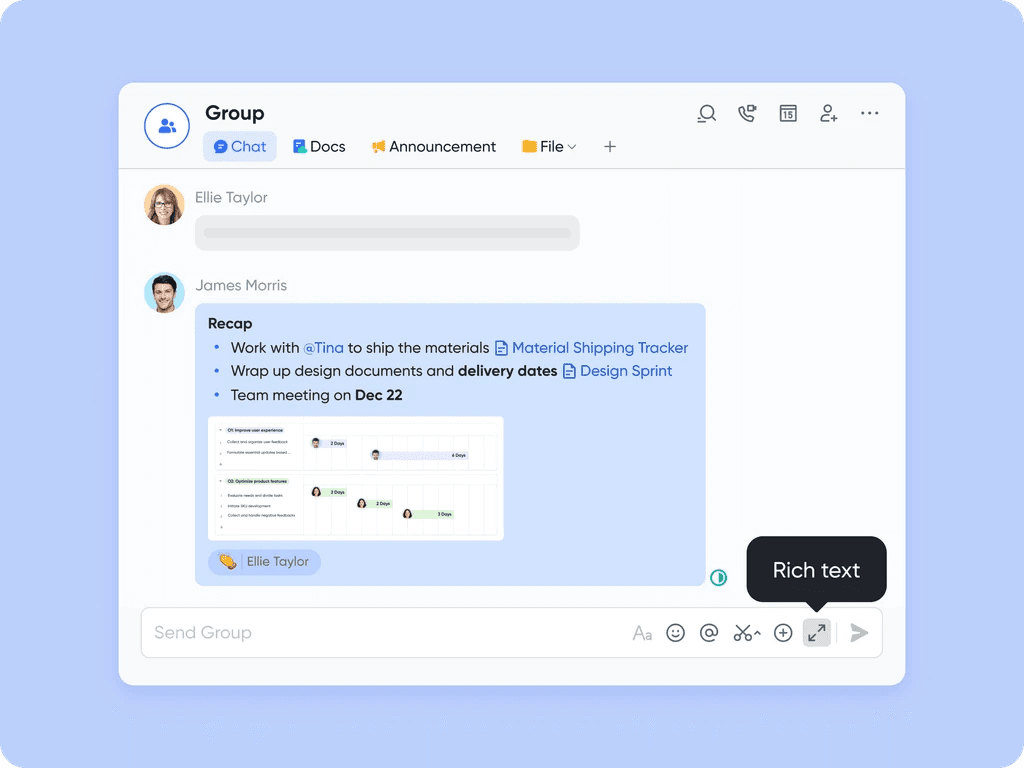
You can format your messages properly using bold, italic, strikethrough, bullets, numbers, quotes, links, and even code blocks. Along with text, you can send screenshots, screen recordings, and scrollshots. It also allows you to share events, contact cards, tasks, files, folders, and almost anything you want.
The notable feature is that you can translate as you type to send messages in languages you don't know. Plus, you can translate others' messages and extract text from images directly in the messenger.
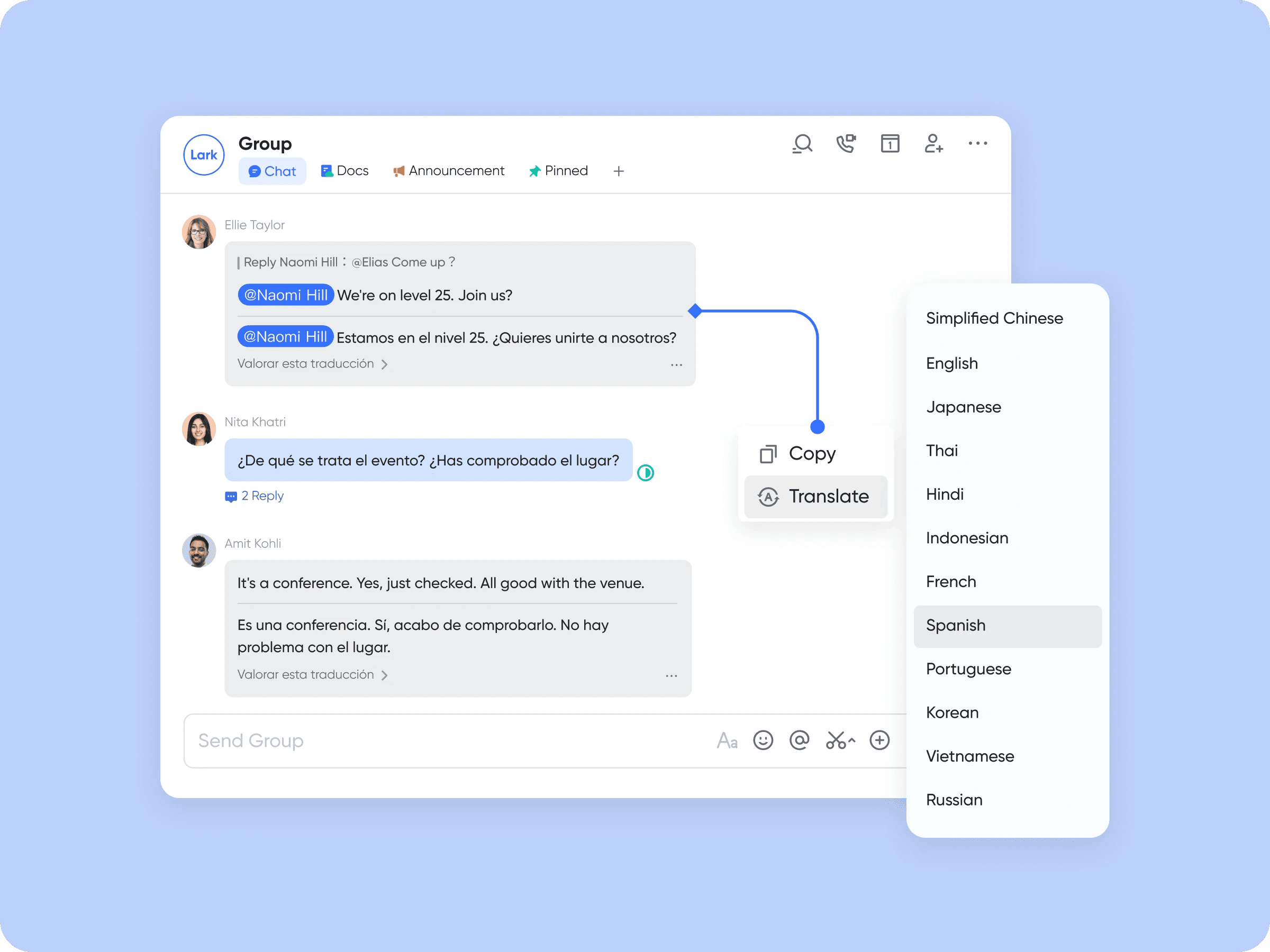
You can create groups in Lark for teams. It boosts effective communication through a unified channel. You can reply in threads to make for confusion-less conversations. It takes collaboration to the next level by offering the entire history of conversations that even new members can see.
Another interesting feature is the scheduling of messages. You can send messages at the right time according to the time zones of your colleagues.
Lark's meeting tool, Meetings, is an incredible WhatsApp alternative for video calling. It supports video and audio conferencing of up to 1,000 participants and 50 breakout sessions.
You can share files, record meeting minutes, record meetings, and transcribe videos. It also translates videos in real-time and shows captions in three languages (English, Chinese, and Japanese). You can also translate transcriptions in more languages once the live ends.
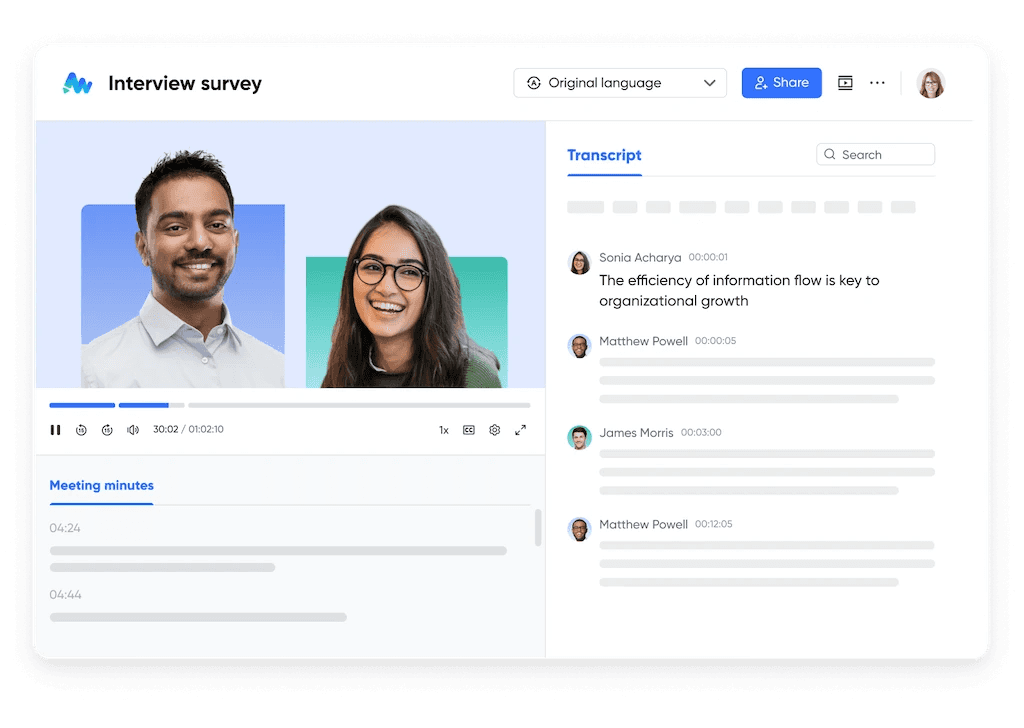
The most important thing about Lark is its privacy protection. Your data is in your control, and no one can access it. It adheres to global privacy standards. It is according to the international regulatory requirements. So, there is nothing to worry about leakage of your personal or organizational data.
Lark offers a lot more than other WhatsApp alternatives. It has various built-in apps that make collaboration and project management a whole lot easier. Apart from that, it can be integrated with other applications, such as Trello, Asana, Jira, and 6,000 more apps through Zapier.
Pros:
Free plan for up to 50 users
Top-notch security and privacy (built-on AWS cloud services and adheres to international privacy regulations)
An all-in-one app for messages, video meetings, documents, email, etc.
Built to manage teams all over the globe through translation features
Watermarks in the messaging app to prevent data leakage
Scheduling of messages
Cons:
Requires some time to master applications
2) Signal
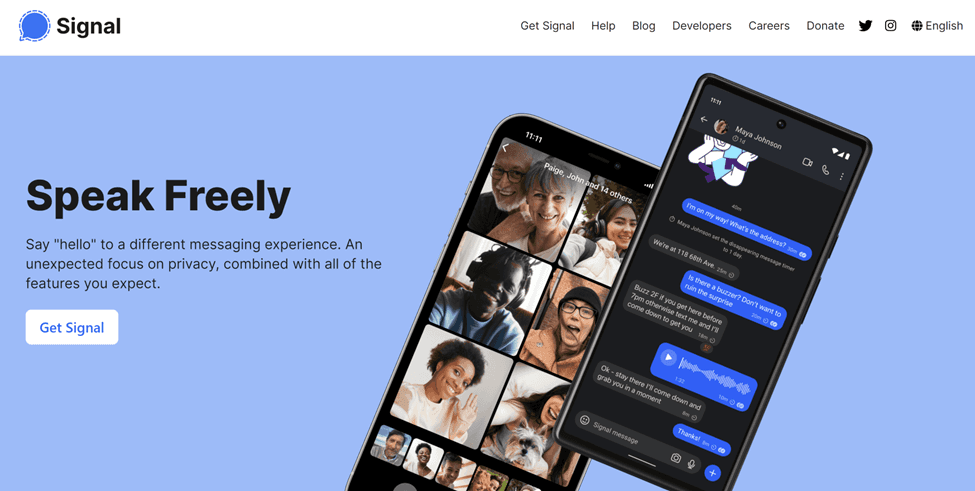
Best for: Day-to-day personal calls and messages
If your main concern is the privacy of WhatsApp, Signal is the best alternative as it is similar. It offers top-notch privacy and security to its users.
It offers end-to-end encryption, which means only you and the receiver can access messages. Its company's end-to-end encryption is also used by WhatsApp. But it is better as there is no involvement of Meta.
It is great for text, voice calls, and video calls. It offers text formatting, message scheduling, screen sharing (desktop calls), in-app payments (certain regions), disappearing messages, stories, and various extraordinary features.
It is more privacy-centric than other alternatives and is free to use.
Pros:
Prevents users from taking screenshots, which enhances the security
Self-destructing messages (removes messages automatically after a set timer)
User-friendly interface
No tracking of personal data
Edit messages up to 10 times within 24 hours
Cons:
No cloud backup option to recover data
Not suitable for business and collaboration
3) Telegram
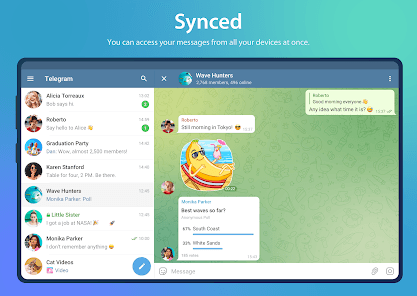
Best for: Personal calls and messages, large communities, and businesses (new feature)
Telegram is a popular instant messaging platform with over 800m monthly active users. It offers similar functionality as WhatsApp. You can send messages, make calls, and create groups.
It is a better option for creating large communities as each group can accommodate up to 200,000 members, which is impossible on WhatsApp. It has recently introduced new group features, including stories, emoji status, voice-to-text, etc.
It offers optional end-to-end encryption, so you have the control to turn it on or off. It is based on cloud storage, so it syncs your messages across all devices. The notable feature of Telegram is bots. These are small applications within the application for additional functionality.
At the start of April 2024, Telegram launched new features for businesses. It includes a customized start page, preset replies, business hours, chatbots, etc. It has also started up to 50% ad revenue sharing for public channels with 1,000 subscribers or more. It is a new competitor for WhatsApp Business. But, it is paid.
Pros:
Up to 200,000 group members
Self-destruction messages
Multiple account support without logging out
Large file sharing up to 2GB
Offers username to share with others
Premium Telegram Business for businesses
Cons:
Not as secure as other WhatsApp alternatives
No encryption in groups
4) Viber
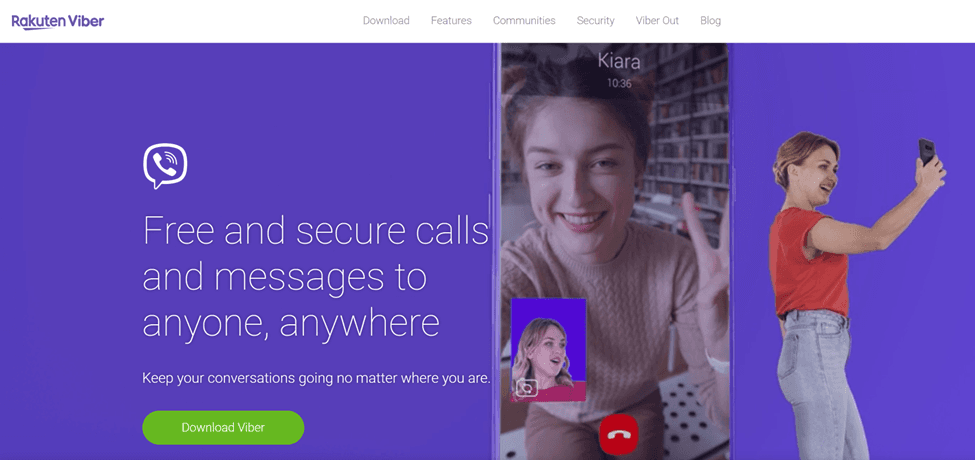
Best for: Daily messaging and calls, international calls on phone numbers at low cost
Viber is an end-to-end encrypted messaging application by Rakuten. All your calls, messages, and even group messages are encrypted to protect your privacy. And if you want more secrecy in chats, you can open secret chats.
The extraordinary feature is Viber Out, a subscription for international calls to mobiles that do not have the Viber app.
The messages on Viber can be edited as well as deleted. You can also create groups on Viber, each having a maximum capacity of up to 250 members.
It also offers Communities where you can interact with people around the world and discuss anything, such as interests and hobbies. Moreover, Viber also empowers channels for brands and broadcast announcements.
The interesting feature of Viber is AR filters. It has partnered with Snapchat to allow users to select filters while taking photos. You can also doodle on any photo and create a custom sticker.
Pros:
Multi-device support—synchronization on all devices
Backs up data to Google Drive
AR-filters to take interesting photos
Commendable privacy and security
Enables international calls to non-Viber users
Possible to hide Viber chats for extra privacy
Cons:
Consumes a lot of resources
5) Threema
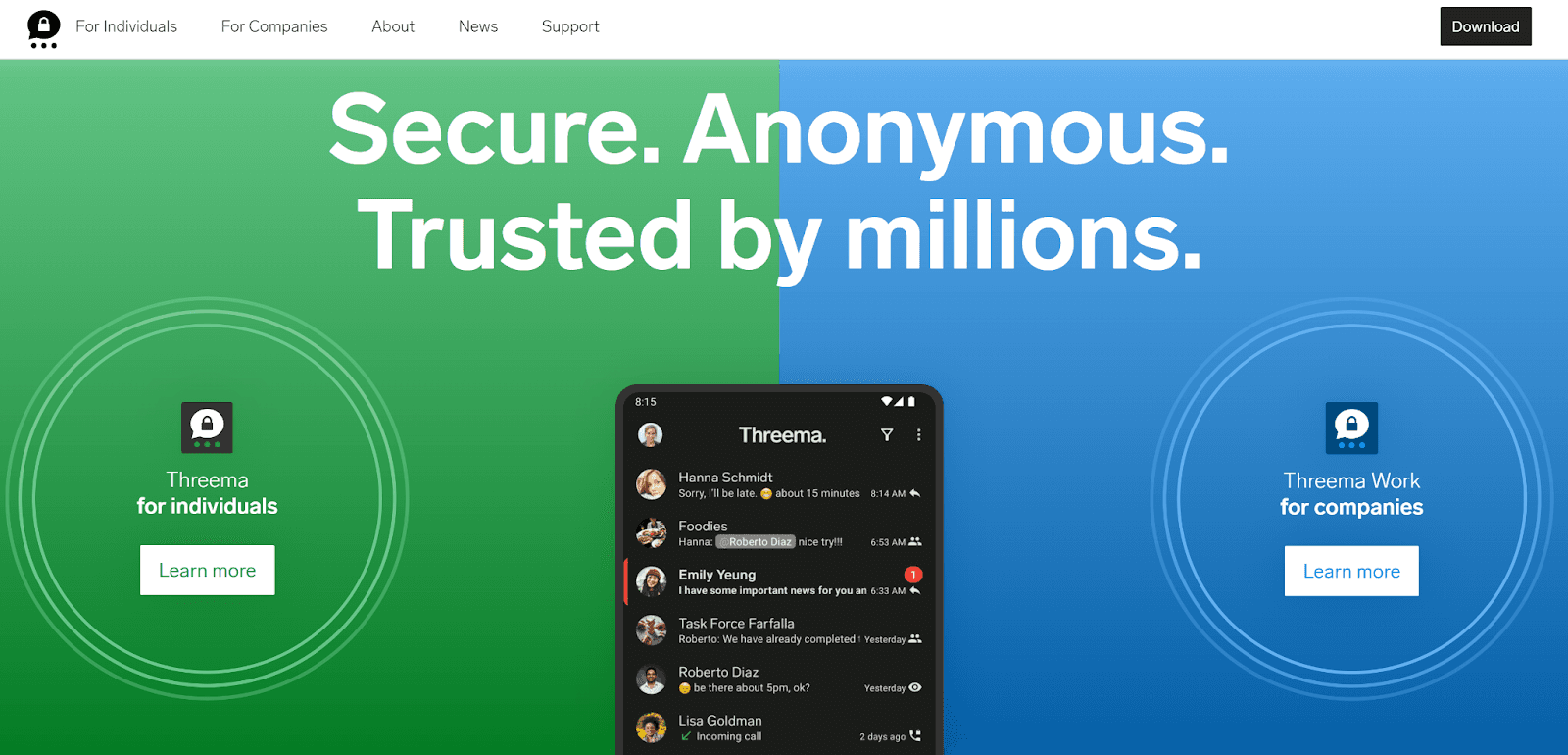
Best for: Individuals (Threema) and companies (Threema Work)
Threema is one of the best paid WhatsApp alternatives because of its privacy and security. All your messages are end-to-end encrypted, so no one can read them, not even Threema itself.
It does not require your personal data, and you can also use it anonymously. No need to share email, address, or even phone number. And the best part—GDPR compliance. You can also have contact verification using their QR code to protect against attacks.
You can send messages, make voice calls, and enjoy video messages. It is possible to format text through bold, italics, and strikethrough. It also supports groups of up to 256 members. You will have to pay the license fee ($4.99 for Android and $8.99 for iOS), but it is worth it.
Most importantly, it offers a dedicated application, Threema Work, for companies as a secure WhatsApp alternative.
Pros:
Incredible privacy and security arrangements
Users can use it anonymously to protect their personal information
Based in Switzerland, which ensures strong privacy laws and regulations
The data is stored on users' devices—no need to worry about data breach
Offers built-in poll to gather opinions
Cons:
Paid application
Small user base
6) Wire
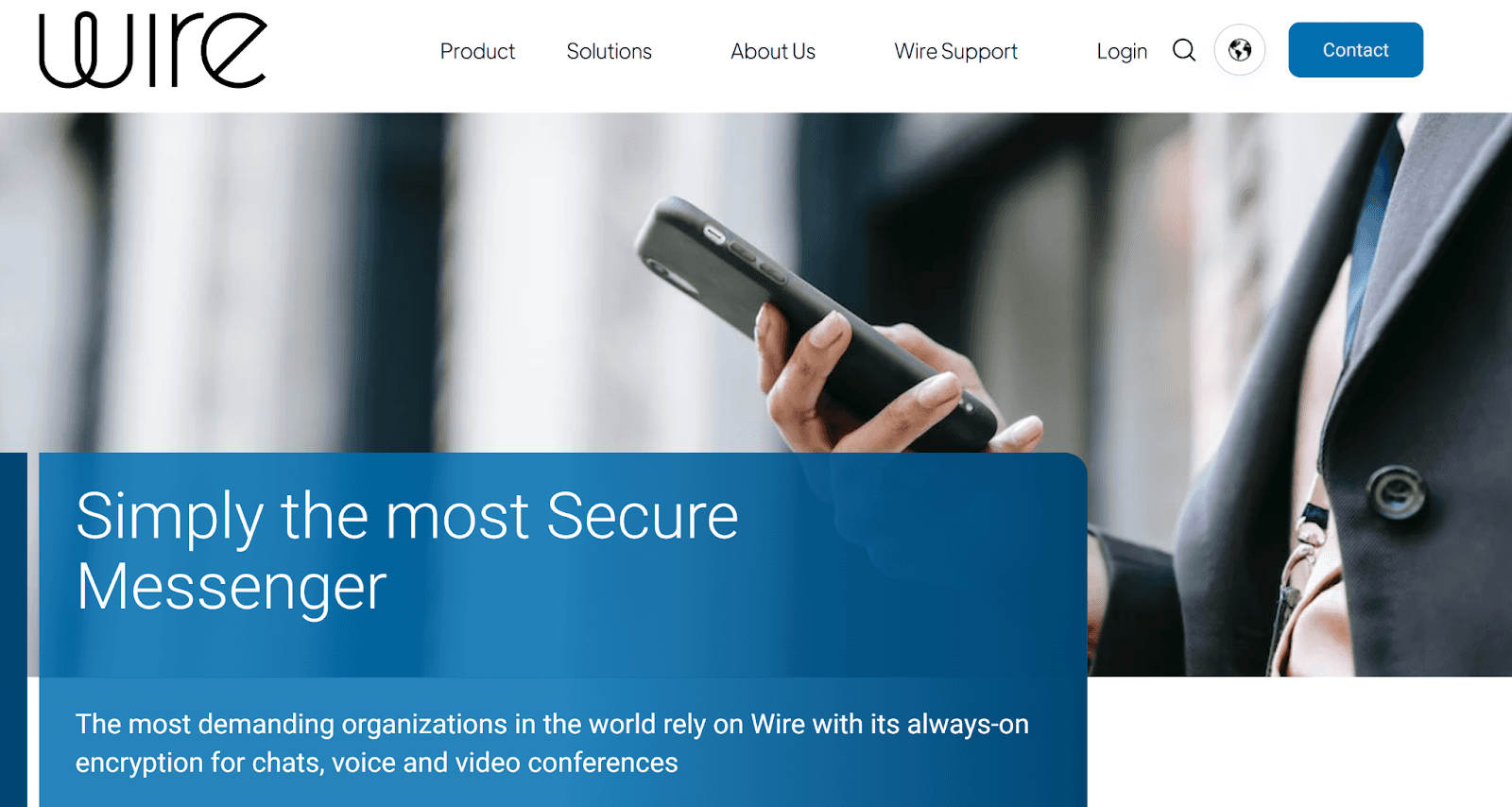
Best for: Individuals and businesses
Wire is a WhatsApp alternative specially created for confidential communication. Whether you are an individual or a business, it ensures optimal security and privacy.
It offers zero-knowledge security, which means your private communication is not even accessible to the Wire. All your messages, calls, and files are end-to-end encrypted. It is based on the world's first open protocol, which facilitates end-to-end encrypted communication in real time.
It is an excellent messaging application that supports voice calls and file transfer. You can also do secure audio and video conferences of up to 100 participants.
It is free for individuals. However, businesses need to pay a premium for extraordinary features. The best part is that it provides Wire cloud and Wire on-premises storage for optimal security.
Pros:
Supports multiple devices and multiple accounts
Open source and secure messaging app with Messaging Layer Security (MLS)
GDPR compliant
Screen-sharing via desktop version
Cons:
Bugs are common
Excellent privacy but limited features
7) LINE
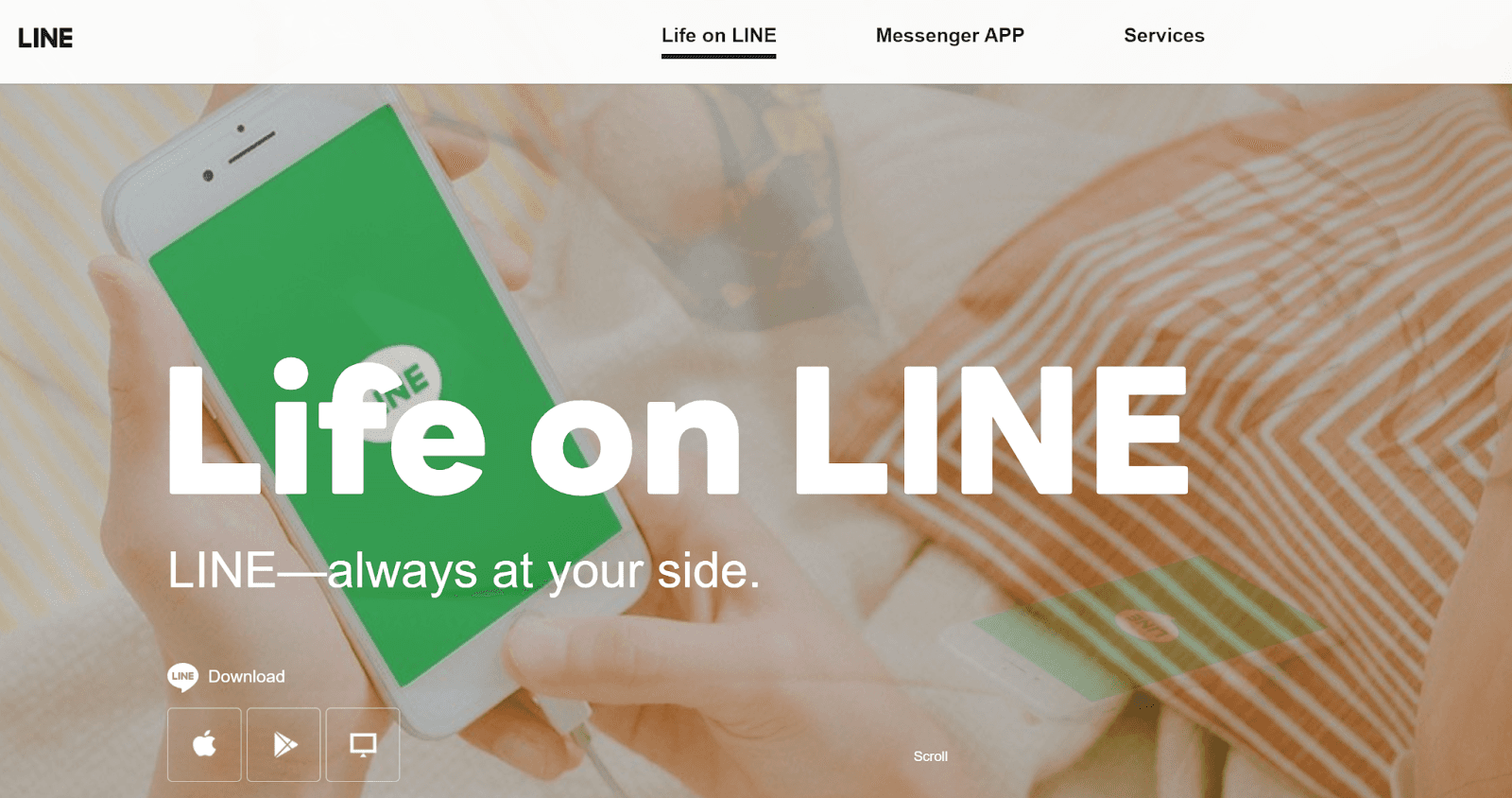
Best for: Day-to-day messages and calls, payments, short-form content, etc.
LINE is not just a simple instant messenger application. Apart from calls, videos, and texts, you can meet new people with similar interests, just like social media. You can also explore the content of creators and follow anyone you like.
LINE also integrates a payment method, Line Pay. You can send and receive money and enjoy other financial services. It also offers a series of different applications, including LINE NEWS, LINE Doctor, LINE MUSIC, games, and a ton of other things.
It incorporates end-to-end encryption to protect user's private data. You can even make international calls to non-LINE users.
Pros
LINE VOOM to post short-form videos and gain followers
Passcode lock on the app for extra privacy
Timeline for status updates
Offers a profile that includes a picture, cover photo, status, and website link
A complete family of different apps for investing in stocks to food delivery
Cons
Not as simple as WhatsApp; too many things confuse new users
Popular in selected regions, especially Japan
8) WeChat
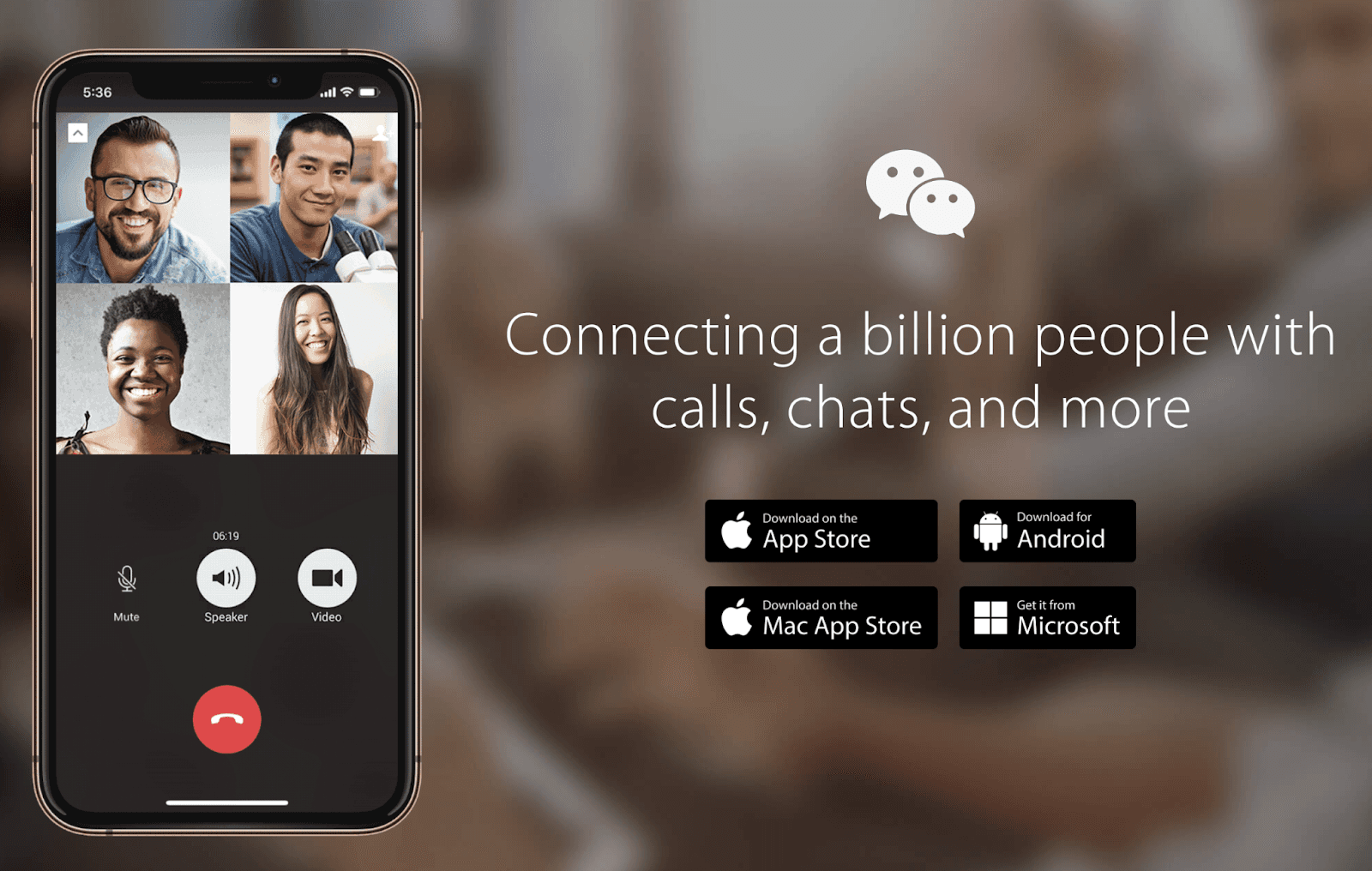
Best for: Messages, calls, payments, short-form content, daily services, etc.
WeChat is an all-in-one messaging application that offers extraordinary features you won't find in any other messaging app on the market.
With WeChat, you can do messages, calls, voice messages, and video calls. You can also create groups for friends, family, and workplace. It also has an option to find people nearby.
The unique thing about WeChat is its Discover tab. Here, you will see the moments shared by your contacts, and you can also share anything you like. It also offers a short video platform called Channels. You can follow your favorite content creators.
WeChat is a complete app. It allows you to receive and send money, pay utility bills, create QR codes, etc. You can also enjoy services, such as health, charity, public services, hotels, flights, discount sales, and a lot more.
It uses AES 256 encryption for the protection of users' data. It does not retain your data on its servers. Your messages and other data are deleted within 72-120 hours.
Pros:
Ideal all for messages, calls, and video calls
Image-to-text and translation feature
You can search directly on the app—no need to use Google.
Set reminders for messages in the app
Enjoy the content you like on Channels
Cons:
It is mostly used in China, and most features are unavailable in other locations.
The privacy of the platform is still questionable for people
9) DingTalk
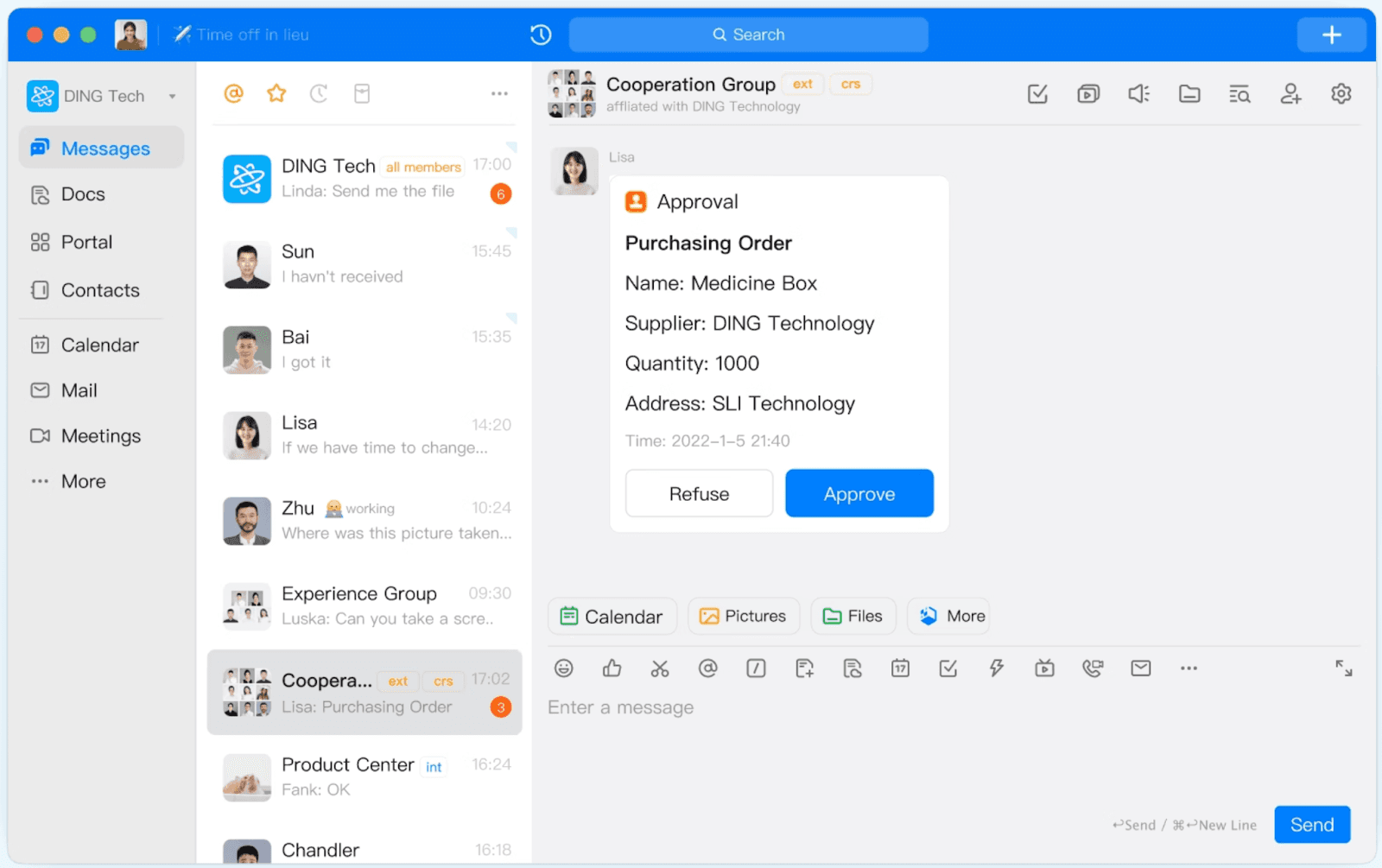
Best for: Team management and collaboration
DingTalk is an all-in-one platform for messaging, video conferencing, group chats, file sharing, and project management.
It makes team and group communication a lot more efficient and organized. All employees within an organization can use the instant messaging application easily. It is user-friendly and offers notifications and reminders. Team members can send files, approvals, formatted messages, tasks, calendar dates, etc.
It also allows video conferencing of up to 300 members and ensures excellent video quality. Users can also create groups for chatting and collaboration. It facilitates task management, including assigning tasks and tracking.
DingTalk is an excellent option for enterprises because of its advanced encryption and GDPR compliance.
Pros:
Facilitates secure, quick, and hassle-free communication between team members
An all-in-one tool for email, messages, file-sharing, and project management
Allows screen sharing during meetings
Integrates a calendar to make collaboration seamless
Cons:
Mostly used in China
Bugs and frequent app crashes
10) imo
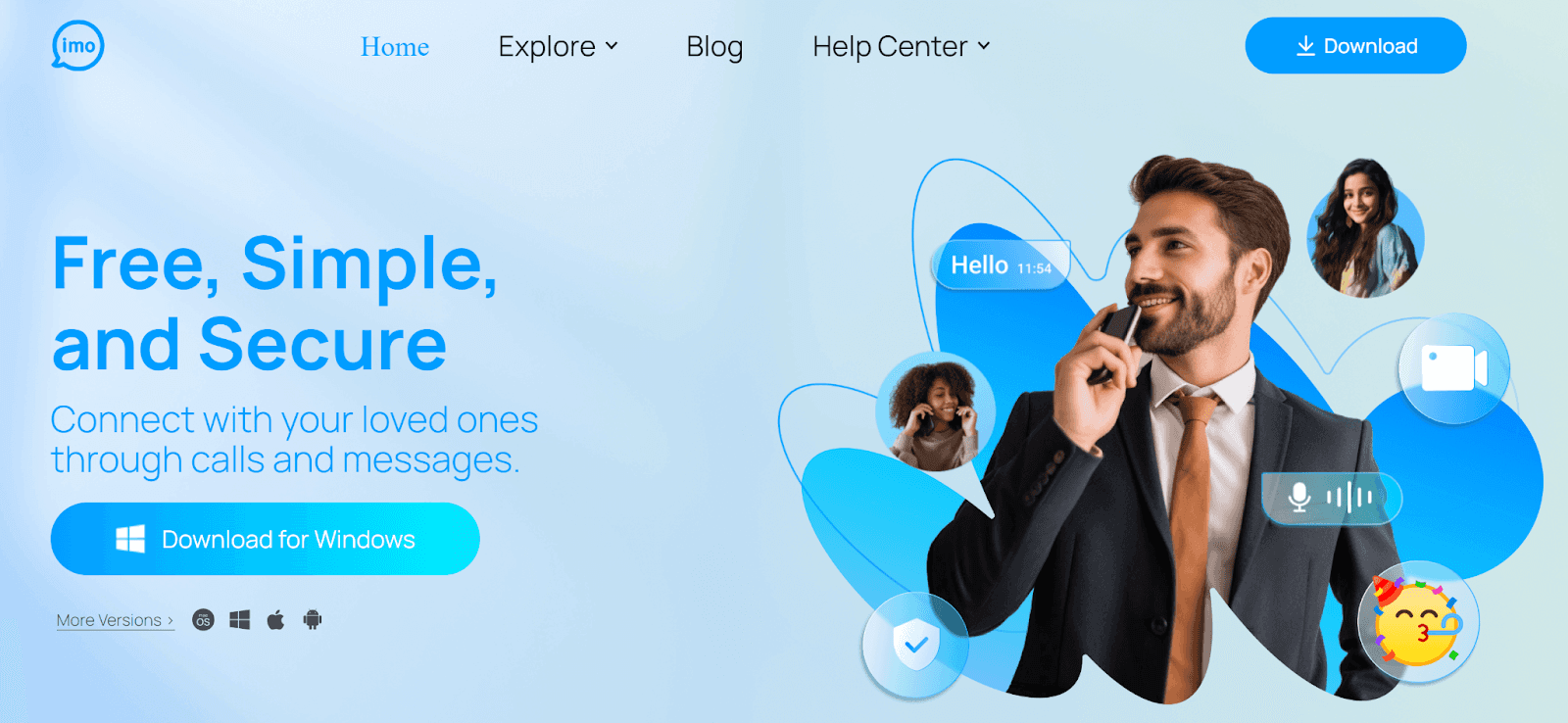
Best for: Daily messages and calls to friends and family
imo is a free WhatsApp alternative with better security. It is mostly used for connecting with friends and family. It supports messages, voice calls, video calls, and group chats. The best part is that you can do cross-platform calls, such as calls to WhatsApp, just by sharing a link.
It is excellent for communicating with people from different countries. It can instantly translate messages for better understanding.
The app is secured via 2-step verification, so no one can access your account. Your private data is end-to-end encrypted to ensure privacy.
To enhance privacy, imo has recently introduced some incredible features. You can use Time Machine to delete any conversation from the history irrespective of when it was sent. It also blocks screenshots during calls, so users can rest assured no one can capture their image or record video. Last but not least is its friend request feature, which prevents unknown users from sending messages.
Pros:
Excellent privacy and security
Blocks screenshots during calls
Users can set disappearing messages
Cons:
Ads are irritating for users
11) Element
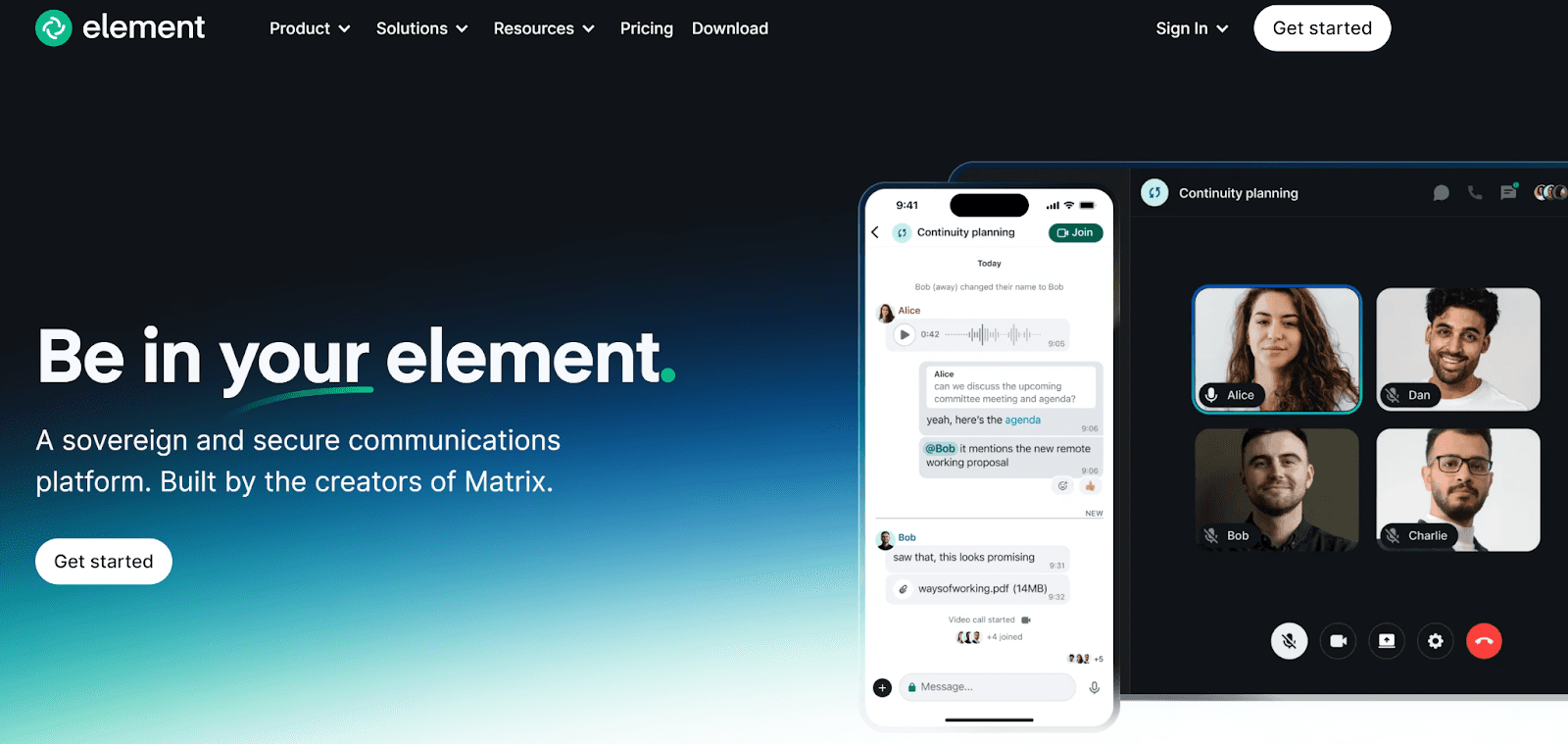
Best for: Team collaboration
Element is specifically built for collaboration. It supports text messages, audio calls, and video conferencing. You can also do unlimited audio and video calls whether 1:1 or in groups.
It offers a secure end-to-end encrypted messenger to keep your conversations private. Most importantly, it is decentralized, which ensures no single-point failure, and you retain ownership and control of your data.
Your team can use Element without any worries. It is one of the most secure messaging and collaboration tools out there.
Pros:
Data sovereignty and control
No single point of failure
Incredible video and voice call quality
No tracking of personal data
Cons:
Requires time to learn; not as simple as WhatsApp
Smaller user base
FAQs
Are there good alternatives to WhatsApp?
Yes, there are many good alternatives to WhatsApp that you can use for day-to-day calls and messages and business dealings. We have shared the top 10 WhatsApp alternatives along with the pros and cons to make your selection easier.
Who is the biggest competitor of WhatsApp?
The two biggest competitors of WhatsApp are Signal and Telegram. These apps offer instant messaging, voice calls, video calls, and other features.
Which app is safer than WhatsApp?
Lark, Signal, Threema, and Wire are safer than WhatsApp. However, all of them are suitable for different purposes. Check out our shared details and select the right one for your needs.
Deciding on a WhatsApp Alternative
For a WhatsApp user, it is difficult to acclimate to a new instant messaging application. However, it is necessary to ensure the privacy of personal data and information.
The experience of using a WhatsApp alternative can be pleasing if you select the right one according to your needs.
Consider the privacy and security arrangements, basic features, user base, and other important factors we have mentioned. You can easily find a WhatsApp alternative offering better features and privacy.
Whether you go with Lark, Signal, Telegram, or any other WhatsApp alternative, understand what the app offers and its use cases.
All these WhatsApp alternatives are incredible, but you have to decide which is the best.















